Department Requirements
Students who join the Drama Department must take two classes a year for the four years that they attend Parkview. Those classes are as follows
- 9th grade Theatre I and Theatre Appreciation.
- 10th grade Theatre History and one course from the list below.
- 11th grade two course from the list below.
- 12th grade two courses from the list below.
Theatre I
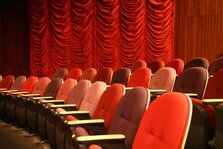
Theatre I is a two-semester course in which students learn and demonstrate mastery of theatre academic and performance skills. At the Theatre I level, students will explore theatre fundamentals, analyze and interpret scripts, evaluate artistic work, and use those evaluations to deepen the meaning of their work. Theatre I contains an introduction to stagecraft skills. Theatre I fulfills the one-half credit fine arts required for graduation and is a prerequisite course for all non-drama magnet students wishing to take additional drama elective classes.
Theatre Appreciation

This course is a two-semester course designed to be a survey of the elements of dramatic/theatric communication; intended to develop understanding and enjoyment of the theatre in all of its forms; lectures, readings, and demonstrations. This course will also give a historical overview of Western Theatre from European Theatre & Drama in the Middle Ages through Contemporary American Theatre. This is an academic course with a required text, regular reading assignments and assessments through testing and classroom exercises. The course includes the in-class reading of plays, video demonstration of the physical period productions, and the attendance of multiple theatre productions. This course is required for 9th grade drama magnet students; it is closed to all other students.
Children's Theatre
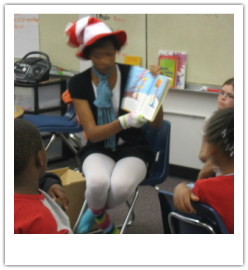
Theatre II is a two-semester course where students will focus on the practical application of skills developed in Theatre I. Theatre II is a two-semester course which expands the knowledge and performance base of Theatre I. Students will take on more complex projects and may begin to develop directorial skills. Ultimately, students will make artistic decisions using multiple forms of inspiration, particularly focusing on social, cultural, and historical context. Course prerequisite: Theatre I
Theatre History
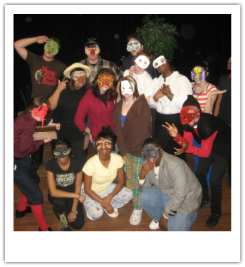
Theatre History is a two-semester course designed for students who have successfully completed or are concurrently enrolled in Drama I. Theatre History is an intermediate course structured to develop and reinforce literary and performance components of theatre through performance exercises and critical analysis. These assignments are designed to facilitate students in: 1) understanding and appreciating major forms of theatre from across the globe, 2) critically analyzing the evolution of theatre in the Western hemisphere, and 3) evaluating the role of theatre in today’s society. We will critically analyze major movements within theatre history for their notable artists and plays, theoretical and practical contributions to the field, and overall significance to contemporary society both then and now. We reinforce this theoretical understanding of theatre history with direct applications in the form of hands-on activities including the creation of staging elements and visual aids as well as in-class performances. Course prerequisite: Theatre I
Acting (I, II, III)
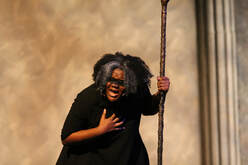
Acting I is a two-semester course where students gain an appreciation for and understanding of Realism and a firm grounding in Stanislavski and his teaching descendants; explore Realist performance theory through writing and acting exercises, and apply Realist performance theory in scene work. Class time alternates between large group teaching, small group rehearsals, and performance. During large group teaching time, students listen to lectures and take notes on theories to be applied in scene work and complete writing and acting exercises for unit. During small group rehearsals, students analyze and rehearse scenes with partners or in small groups. During performances, students perform scenes for each other and provide feedback. Acting I students will work on scenes from within the Realist movement including selections from Chekov, Ibsen, Williams, Shaw, O’Neill, Miller, Mamet, Wilson, and Hellman. Throughout the process, we integrate vocal and movement work, so that students learn how to use these fundamental tools of acting.
Course prerequisite: Theatre I
Acting II is a two-semester course where students gain an appreciation for and understanding of the Classics; explore the Classics through writing and acting exercises, and apply performance theory in Classical scene work. Class time alternates between large group teaching, small group rehearsals, and performance. During large group teaching time, students listen to lectures and take notes on theories to be applied in scene work and complete writing and acting exercises for unit. During small group rehearsals, students analyze and rehearse scenes with partners or in small groups and coach Acting I students in their scene work. During performances, students perform scenes for each other and provide feedback. All scenes are performed twice. Acting II students will work on Classical scenes including selections from Ancient Greek and Roman plays, Medieval plays, Shakespearean plays, Neoclassical plays, and Restoration plays. Throughout the process, we integrate vocal and movement work, so that students learn how to use these fundamental tools of acting. Additionally, Acting II deepen their knowledge of performance theory and practice through coaching Acting I students. To equip Acting II students for leadership success, Acting II students explore the pedagogy of acting and practice facilitation and mentoring skills. Course prerequisite: Acting I
Acting III is a two-semester course where students gain an appreciation for and understanding of Post-Realist performance movements; explore post-Realism through writing and acting exercises, and apply performance theory in Post-Realism scene work. Class time alternates between large group teaching, small group rehearsals, and performance. During large group teaching time, students listen to lectures and take notes on theories to be applied in scene work and complete writing and acting exercises for unit. During small group rehearsals, students analyze and rehearse scenes with partners or in small groups and direct Acting II students in their scene work. During performances, students perform scenes for each other and provide feedback. All scenes are performed twice. Acting III students will work on scenes representative of Post-Realism including selections from Brecht, Pinter, Ionesco, Beckett, Albee, and Sartre. Throughout the process, we integrate vocal and movement work, so that students learn how to use these fundamental tools of acting. Additionally, Acting III deepens their knowledge of performance theory and practice through directing Acting II students. To equip Acting III students for leadership success, Acting III students explore the art of directing through reading, discussion, and application. Course prerequisites: Acting I and Acting II
Course prerequisite: Theatre I
Acting II is a two-semester course where students gain an appreciation for and understanding of the Classics; explore the Classics through writing and acting exercises, and apply performance theory in Classical scene work. Class time alternates between large group teaching, small group rehearsals, and performance. During large group teaching time, students listen to lectures and take notes on theories to be applied in scene work and complete writing and acting exercises for unit. During small group rehearsals, students analyze and rehearse scenes with partners or in small groups and coach Acting I students in their scene work. During performances, students perform scenes for each other and provide feedback. All scenes are performed twice. Acting II students will work on Classical scenes including selections from Ancient Greek and Roman plays, Medieval plays, Shakespearean plays, Neoclassical plays, and Restoration plays. Throughout the process, we integrate vocal and movement work, so that students learn how to use these fundamental tools of acting. Additionally, Acting II deepen their knowledge of performance theory and practice through coaching Acting I students. To equip Acting II students for leadership success, Acting II students explore the pedagogy of acting and practice facilitation and mentoring skills. Course prerequisite: Acting I
Acting III is a two-semester course where students gain an appreciation for and understanding of Post-Realist performance movements; explore post-Realism through writing and acting exercises, and apply performance theory in Post-Realism scene work. Class time alternates between large group teaching, small group rehearsals, and performance. During large group teaching time, students listen to lectures and take notes on theories to be applied in scene work and complete writing and acting exercises for unit. During small group rehearsals, students analyze and rehearse scenes with partners or in small groups and direct Acting II students in their scene work. During performances, students perform scenes for each other and provide feedback. All scenes are performed twice. Acting III students will work on scenes representative of Post-Realism including selections from Brecht, Pinter, Ionesco, Beckett, Albee, and Sartre. Throughout the process, we integrate vocal and movement work, so that students learn how to use these fundamental tools of acting. Additionally, Acting III deepens their knowledge of performance theory and practice through directing Acting II students. To equip Acting III students for leadership success, Acting III students explore the art of directing through reading, discussion, and application. Course prerequisites: Acting I and Acting II
Mime
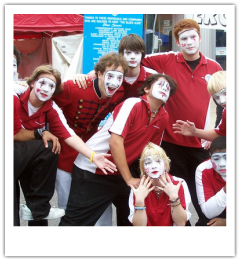
Mime I is a two-semester Fine Arts elective for students in grades 10, 11 and 12. The overall goal of Mime I is to present alternative performance styles and techniques focusing on mime, pantomime, clowning, and performance art. Units will include the history of the art forms, techniques in presenting the art forms, performances of the art form; both in class and in the community. After school hours are required in this class. Course prerequisite: Theatre I
Additional years of Mime may be taken for local credit only.
Additional years of Mime may be taken for local credit only.
Stage Craft
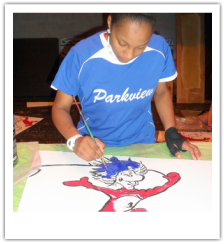
Stagecraft I is a two-semester course which provides students with both exposure to and experience in all elements of technical theatre, including scenery, props, lighting, and sound. The four strands emphasize creating, performing/presenting, responding and connecting. In Creating, students generate ideas and original tangible works. In Performing and Presenting, students perform tasks associated with technical theatre and present their work to others. Through Responding, students examine works already created by themselves, their peers, or others to analyze the artistic merit and refine work. Through Connecting, students discover connections between theatrical works and historical, societal, and cultural context. Assumes prerequisite abilities honed in Theatre I; advanced study in set, lighting, sound, and props design and construction; includes instruction in directing and stage management. Enrollment by application--requires proven responsibility and cooperation due to working conditions, which include expensive and potentially dangerous equipment, and maturity which allows independent work on complicated tasks. Many performance opportunities include preparation for various school assemblies as well as major theatrical productions. After school hours are required in this class. Stagecraft I fulfills the one-half credit fine arts required for graduation and is a prerequisite course (along with Theatre I) for all non-drama magnet students wishing to take additional drama elective classes.
Stagecraft II and Stagecraft III These two-semester advanced courses are designed to build upon the knowledge and skills developed in Stagecraft I. Stagecraft II is a two-semester course which allows students to advance their skills in all elements of technical theatre through practical experience, with new instruction in design. Stagecraft III is a two-semester course which allows students to deepen their understanding and advance their skills in specialized elements of technical theatre, which could include scenery, props, lighting, sound, costume, and/or makeup. The emphasis is on design in technical theatre as well as stage management. Course prerequisite: Stagecraft I and teacher approval. After school hours are required in this class.
Stagecraft II and Stagecraft III These two-semester advanced courses are designed to build upon the knowledge and skills developed in Stagecraft I. Stagecraft II is a two-semester course which allows students to advance their skills in all elements of technical theatre through practical experience, with new instruction in design. Stagecraft III is a two-semester course which allows students to deepen their understanding and advance their skills in specialized elements of technical theatre, which could include scenery, props, lighting, sound, costume, and/or makeup. The emphasis is on design in technical theatre as well as stage management. Course prerequisite: Stagecraft I and teacher approval. After school hours are required in this class.
Cinema Arts
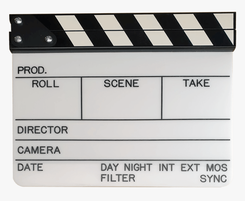
Cinema Arts is a two-semester course designed to facilitate students in understanding, analyzing, creating, and evaluating motion pictures through studying existing works and collaborating to produce their own. A widely embraced discipline within the larger dramatic arts umbrella, filmmaking draws upon the same core principles as theatre arts-- scriptwriting, design, directing, acting-- and allows for artists to craft the auditory and visual experience in exciting ways that would not be possible in a live theatrical presentation. In the first semester we will learn the fundamentals of film - a survey of the history, genres, and elements of the medium. Then we will explore the process through which a screenplay is planned and written. In the second semester, we will walk through the steps of pre-production, production, and post-production in the film industry. During these units, students will be working collaboratively to design and produce their own works culminating in an exhibition of student short films in an in-house film festival. By the end of the year, students will have a thorough theoretical and practical knowledge of the methods and techniques of digital filmmaking.
Course prerequisite: Theatre I|
Course prerequisite: Theatre I|
Costume & Makeup
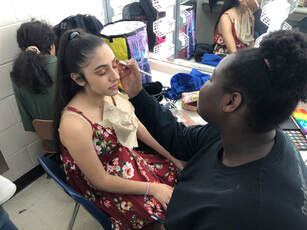
Costume and Makeup is a two semester course that introduces students to the basics of costume and makeup design for theatre by script analysis, an understanding of the principles of design, and practical application. Students learn makeup application skills for a variety of needs that arise within the theatre in order to execute the look needed for a character. Hand sewing and basic machine sewing skills are also developed so that students have the ability to create costume pieces for use in any production.
Course prerequisite: Theatre I
Course prerequisite: Theatre I
ADDITIONAL ARTS COURSES

Debate I, II, III – allows students to study argumentation through cross-examination debate, student congress and mock trial. Debate students not only travel to competitions within the state of Arkansas, but also travel on the national circuit performing in places like New Orleans and Boston.
Musical Theatre Performance – is open to 11th and 12 graders who apply and audition for a space. Students must have been enrolled in an upper level performing group in the vocal music or theatre programs and/or have had successful experience in Fine Arts activities. This class involves students that must be willing to perform outside school hours in solo or ensemble performances.
Musical Theatre Performance – is open to 11th and 12 graders who apply and audition for a space. Students must have been enrolled in an upper level performing group in the vocal music or theatre programs and/or have had successful experience in Fine Arts activities. This class involves students that must be willing to perform outside school hours in solo or ensemble performances.
Voice Training

Voice training is available for Parkview Drama students through the Parkview Chior Program. Visit their weibsite to learn more: http://parkview.lrsd3.org/choir.htm
Dance Training

Dance training is availble for Parkview Drama students through the Parkveiw Dance Program. Visit their website to learn more: http://parkview.lrsd3.org/dance.htm
